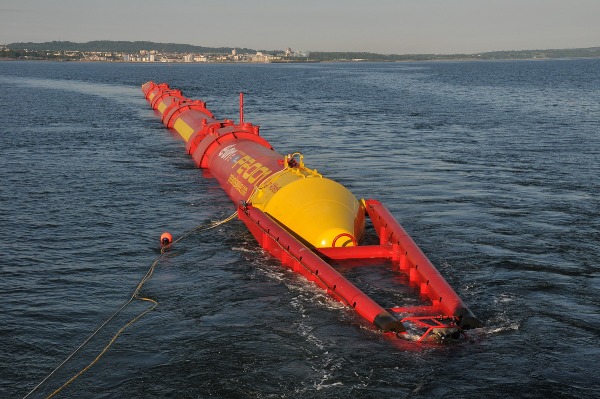The inventor of an iconic wave energy device has been honored for his contribution to the marine renewables sector.
Richard Yemm, pictured below at right, is the founder of Pelamis Wave Power. His company makes giant wave machines that sit semi-submerged in the open seas and whose long tubular design has led to them becoming known as “sea snakes”.

Their success has led to a string of high-profile energy companies ordering the devices and in 2008, Pelamis created the world’s first commercial-scale wave-power station off the Portuguese coast.
This week Yemm was presented with the second annual Saltire Prize Medal. The award recognizes outstanding contributions in the development of wave and tidal power generation. Yemm received his award from Scotland First Minster Alex Sammond at the Scottish Renewables conference dinner in Edinburgh.
“Richard’s drive, ambition and vision should be an inspiration to many young people who are considering careers in engineering, science and the energy industry,” Sammond said in a statement.
Since Yemm formed the company in 1998, Pelamis now boasts major international utilities E.On, ScottishPower and Vattenfall among its customers.
In 2008, it helped created a commercial-scale wave-power station. The company installed a set of three of its sea snakes in the Atlantic, three miles from the coast of the northern Portuguese town of Aguçadoura. Power generated by the Pelamis devices was carried by undersea cable to a substation onshore. Funded by the Portuguese government the project is capable of generating clean electricity for up to 1,500 family homes.
The Pelamis devices are 465 feet long, with a diameter of nearly 12 feet and are made from more than 1.5 million pounds of carbon steel. Bobbing up and down on the constant supply of waves in open seas, the devices convert this motion into electricity. Each of the wave converters has four articulated sections that move up and down as the waves pass along it. Where the sections join hydraulic rams are located. The rams use the wave motion to drive generators to produce up to 750 kilowatts of power at peak output.
Accepting the award, Yemm said in a press release: “This is an individual award, but wherever you take the time to look across this exciting new sector you can see exceptional individuals working together as one team to deliver on the ‘win-win’ of clean energy and economic development opportunity that marine energy represents.
“Our sector has a unique cohesiveness forged by experience that working together gives us—and an output much greater than the sum of the parts.”

Yemm is the second person to get the Saltire Prize medal, given under the auspices of Scotland’s £10 million ($15.8 million) Saltire Prize marine energy challenge. Under the terms of the challenge, the money will be awarded to the team that can demonstrate, in Scottish waters, a commercially viable wave or tidal stream energy technology that achieves the greatest volume of electrical output, over the set minimum hurdle of 100 gigawatt-hours, over a continuous two-year period, using only sea power.
It has so far attracted more than 150 registrations of interest from around the world.